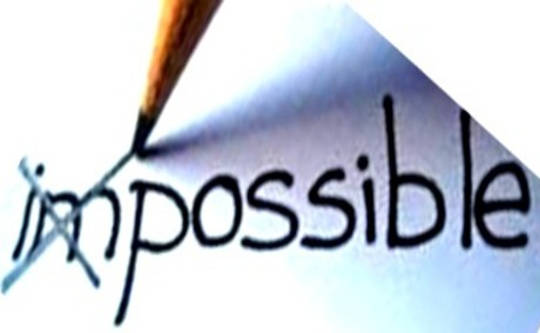
When people don't set goals, they usually have good excuses. I'll discuss some of the most common excuses and offer a spiritual perspective on each.
I Can't Pick a Goal
Some lucky folks have only one aspiration weighing on their minds, making it easy to choose a goal. Others can't seem to focus on anything specific. They're either overwhelmed with possibilities or they're indecisive and nothing stands out. In either case, there are many ways to get around it. Try any of the following suggestions:
• Choose a goal that's easy to meet. Build your confidence by starting small.
• Work on organization first. That is, pick a goal that provides a foundation for your efforts: clearing your desk, organizing your files, updating your software, cleaning out your closet. It's much easier to start an important project when your world is more orderly.
• Pick something that involves another person. Working as a team is a great way to keep up your motivation and energy.
• Divide goals into two groups: complicated and simple. Pick one from the "simple" side.
• Which goal do you instinctively turn away from? Perhaps tackling the most challenging goal first is the best way to wake up your energy.
• Write some goals on little pieces of paper and stick them to a dartboard, then throw a dart at them. Voila! Your goal is selected!
• Try something off the wall. Take up aikido or decide to grow vegetables in your yard. A new project can be revitalizing and will generate energy for the other goals on your list. This is because energy and momentum empower you. Their positive effects are felt throughout your world, not just in one area.
• Have your best friend choose a goal for you. Often, friends can see things you can't.
Enlist your friend as a goal buddy to help define your direction and support you when you feel like giving up.
THE SPIRITUAL PERSPECTIVE: Relax. It doesn't matter which goal you choose. All actions foster awakening — the real purpose of your existence. If you're feeling particularly burdened by the decision process, ask for comfort and direction during prayer time. Then get started on something — anything — and listen for your guidance to come through action, not idleness.
I'm Not Motivated
 Most people expect to ride motivation like they might surf a wave. They hang back, biding their time, assuming that the perfect curl will suddenly appear and carry them easily. They say things like: "I'll start that project when I feel motivated," "I'm just not ready, I guess," or "It's not the right time yet."
Most people expect to ride motivation like they might surf a wave. They hang back, biding their time, assuming that the perfect curl will suddenly appear and carry them easily. They say things like: "I'll start that project when I feel motivated," "I'm just not ready, I guess," or "It's not the right time yet."
The problem is that motivation is unpredictable; it waxes and wanes with your circumstances and emotions. For example, if you sprain your back, fear can motivate you to take up yoga. If your check bounces, embarrassment can motivate you to balance your checkbook. Events are as unpredictable as the incentive they generate. Don't wait. Enthusiasm and motivation build up faster and more reliably when you take action first.
THE SPIRITUAL PERSPECTIVE: Emotional states are interesting, powerful, and compelling, but they should not be the only fuel you use to generate action. When you center yourself in Being, you become open to the infinite source of energy that never runs dry. That source doesn't rely on emotion or circumstances, and its foundation is generosity of spirit. From this vantage point, you take action because it is your divine nature to do so.
I Don't Follow Through
 Think about how upset you would feel if your best friend told you that you were no longer trustworthy. You'd need to have a long honest talk, then make it a priority to follow through with your promises. Well, you also have a trust relationship with yourself. When self-trust is weak, you don't believe in your own ability to follow through with commitments. You resist meaningful projects. If you do try something big, your stress load will shoot way up and you won't be able to tolerate the burden. You'll give up.
Think about how upset you would feel if your best friend told you that you were no longer trustworthy. You'd need to have a long honest talk, then make it a priority to follow through with your promises. Well, you also have a trust relationship with yourself. When self-trust is weak, you don't believe in your own ability to follow through with commitments. You resist meaningful projects. If you do try something big, your stress load will shoot way up and you won't be able to tolerate the burden. You'll give up.
Fortunately, trust in yourself is something you can rebuild. First, you must release the vision of yourself as untrustworthy. This is more difficult than it first appears because unreliability has a payoff -- someone else does the hard stuff, and you get to take it easy. But doing hard stuff builds self-confidence and self-respect; it crafts your character. Hard projects are typically more interesting and satisfying to complete. If you don't take on hard stuff like maintaining relationships, staying healthy, or meeting career goals, you become boring and colorless. You never dance on your growing edge. You stagnate.
Second, you must forgive yourself for your past bad behavior. Continued blame and self-hatred will undermine your efforts. Guilt and blame don't change the past. The best way to make up for past wrongs is by making better choices. Remember, energy follows thought. If your dominant thinking remains self-destructive, it will be hard to change your behavior — and this is the kind of "hard" you'd be smart to avoid. Consider attempting a project that you feel reasonably sure you can complete successfully. Lost trust is like muscle tone; it can be regained, but you have to start small and build it up over time.
THE SPIRITUAL PERSPECTIVE: Belief in yourself can always be rekindled. Every moment is an opportunity to live up to new standards of accountability. Every decision is a fresh chance to take the high road. When you meditate or pray, fill yourself with an image of self-forgiveness. This could be a feminine energy such as Kuan-yin or Mother Mary, a teacher such as Jesus or Buddha, or even a simple warm light. Dotti Coon, proprietor of the busy website "Dotti's Weight Loss Zone" (www.dottisweightlosszone.com) knows all about the importance of beginning again. Her motto: "One day at a time, no guilt, and move on."
I'm Afraid of Failing
 Everyone is afraid of failing. Some of us are afraid from the get-go, others are afraid of failing after we succeed (that's called fear of success). Even though we understand that successful ventures almost always follow several past failures, emotionally we still sec failure as final — no second chance. It's almost a primitive fear. We'll do anything to avoid failing, even if it means never getting started.
Everyone is afraid of failing. Some of us are afraid from the get-go, others are afraid of failing after we succeed (that's called fear of success). Even though we understand that successful ventures almost always follow several past failures, emotionally we still sec failure as final — no second chance. It's almost a primitive fear. We'll do anything to avoid failing, even if it means never getting started.
Failure is nothing more than feedback; it's information. When you fail, you learn something. Next time, you'll have more data and a better chance at success. Of course, this is only so much intellectual mumbo jumbo until you put it into practice. Here are a few suggestions:
• Reframe failure as a positive experience. Failure means that you did something, you took a chance, you had courage, you didn't play it safe. As the saying goes, when you hit a speed bump, at least you know you're moving.
• Remember that failure is relative. I may feel bad because I failed to catch a fish, but the fish feels pretty successful. Even my most spectacular failures (oh, there were some good ones!) produced positive results somewhere down the road. Every failure contains the seeds of victory.
• Rehearse success. Determine which problems you're most likely to encounter and practice handling them successfully. Rehearsal is a standard stress-reduction technique used by speakers, athletes, and actors. Try practicing some of my favorite responses, such as, "So what?" "Who cares?" "Big deal." "Oh, well." "Go figure."
THE SPIRITUAL PERSPECTIVE: Everything fits inside God — even experiences like failure. All experiences have value. This perspective doesn't excuse bad behavior or discount negative events, but it does provide a context for handling them. When you make the decision to find a positive outcome, something wonderful can happen in the unseen.
I'm Too Old, Young, Disabled, Tired .. .
 Some excuses masquerade as good reasons. For example, fifty years ago being physically disabled would have been a good excuse to avoid competitive sports. But today people with disabilities are encouraged to participate in many forms of physical activity. We even have the Paralympics, in which elite disabled athletes are judged by their achievements, not their limitations.
Some excuses masquerade as good reasons. For example, fifty years ago being physically disabled would have been a good excuse to avoid competitive sports. But today people with disabilities are encouraged to participate in many forms of physical activity. We even have the Paralympics, in which elite disabled athletes are judged by their achievements, not their limitations.
People allow all kinds of limitations to keep them from living large. They become what writer Spalding Gray calls "vicarians," living through others because they believe they can't do it themselves. Don't settle for being a vicarian. Life is too wonderful to limit. Tailor your goal to fit your capabilities. Start with small tasks, then gently, slowly, reach beyond your comfort zone. Find your edge and inch past it. You'll be amazed at what you can accomplish — and at the fun you'll have.
THE SPIRITUAL PERSPECTIVE: See yourself as a whole spiritual being, regardless of how limited you may feel. When you center yourself in a quiet frame of mind and consciously align yourself with infinite possibility, you'll find the courage to touch the edges of what can be. Because energy follows thought, your first small step toward a goal helps you take more and more steps in the same direction. You can go much farther than you think.
Reprinted with permission of the publisher,
New World Library. ©2004.
www.newworldlibrary.com
Article Source
Stress Reduction for Busy People: Finding Peace in an Anxious World
by Dawn Groves.
 Offering serious information with a light touch, author Dawn Groves demonstrates how a few choices can change old, bad habits into new, good ones and how parents can not only cope with children but also help them become part of the lower-stress solution.
Offering serious information with a light touch, author Dawn Groves demonstrates how a few choices can change old, bad habits into new, good ones and how parents can not only cope with children but also help them become part of the lower-stress solution.
Info/Order this book. Also available as a Kindle edition.
About the Author
Dawn Groves is a minister, author, and educator who clearly addresses the challenges of people attempting to combine professional achievement, spiritual growth, and a balanced lifestyle. She teaches workshops and classes for the government, private industry, community colleges, and spiritual centers throughout the United States and Canada. She is the author of Meditation for Busy People, Massage for Busy People, and Yoga for Busy People . For information about Dawn's lectures, workshops, classes, and tapes, please visit her website: www.dawngroves.com

























